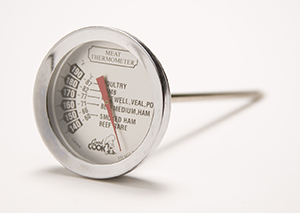E. Coli Intestinal Infection
 |
| Use a food thermometer to make sure meat is cooked to a safe temperature. |
E. coli (Escherichia coli) is a common bacteria found in the environment, foods, and intestines of people and animals. There are a few types (strains) of E. coli. Most are harmless. But some types are harmful. They can cause severe illness because they make a toxin called Shiga. These types of E. coli are called STEC (Shiga toxin-producing E. coli). The most common STEC in the U.S. is a type of E. coli called O157. In some cases, STEC can cause life-threatening symptoms such as a type of kidney failure (HUS or hemolytic uremic syndrome).
You can be infected with E. coli by swallowing food or water that has the bacteria. Contamination occurs when food or water comes in contact with stool from infected humans and animals. The foods that have been affected in E. coli outbreaks include:
Petting zoos and county fairs are places where people can become easily infected with E. coli. That's because live animals and human food are together in one place.
Common symptoms of E. coli infection
In most people, symptoms often appear within 3 to 4 days. But they can sometimes appear 1 to 10 days after having the contaminated food or drink. Symptoms include:
-
Watery or bloody diarrhea
-
Severe belly (abdominal) cramps
-
Upset stomach (nausea) and vomiting
-
Fever, often less than 101°F (38.3°C)
-
General feeling of tiredness and weakness
Diagnosing E. coli infection
A sample of your stool is checked for the presence of E. coli. In addition, you may have:
Blood tests. These may be done if the infection is believed to be more severe or could lead to complications like hemolytic uremic syndrome (HUS). These tests can assess kidney function. They can also check for signs of anemia and low platelet count.
Imaging tests. In rare cases, you may have imaging tests like abdominal X-rays or ultrasound. These may be done if there are signs of severe complications like HUS. Or if the infection has spread to other parts of the body. Imaging tests can evaluate the extent of the infection and any related complications.
Treating E. coli infection
E. coli infection generally gets better without treatment in 5 to 10 days. Antibiotic medicines are often not prescribed. Don't take antidiarrheal medicine unless your healthcare provider tells you to. It can make the illness last longer and decrease your body’s ability to get rid of E. coli. While you're recovering, rest and drink plenty of fluids to prevent dehydration. Water, clear soups, and electrolyte solutions are good choices. You can buy electrolyte solutions at the grocery store or pharmacy. Don't drink alcohol, coffee, tea, and milk. These can irritate your intestines and make symptoms worse.
When to call your healthcare provider
Call your healthcare provider if you:
-
Have symptoms that don't get better or get worse after 2 days
-
Have blood in stool
-
Have severe vomiting
-
Have severe belly pain
-
Have signs of fluid loss (dehydration) such as a dry and sticky mouth, decreased urine output, very dark urine, and confusion
-
Feel very tired
Preventing E. coli infection
Follow these steps to lower the chances of getting or passing E. coli infection:
-
Wash your hands often with soap and clean, running water for at least 20 seconds. Do this before making meals and after going to the bathroom, changing diapers, or handling pets. Teach your child to do the same. If soap and clean water aren't available, you can use hand sanitizer that contains at least 60% alcohol.
-
Cook meats to a safe temperature to kill E. coli bacteria that may be present in the meat. Use a food thermometer when cooking. Follow these temperature guidelines:
-
Cook ground meat (beef, veal, pork, lamb) and meat mixtures to at least 160°F (71°C).
-
Cook fresh beef, veal, lamb, and pork (steak, roasts, chops) to at least 145°F (63°C).
-
Cook all poultry (including ground turkey and chicken) to an internal temperature of at least 165°F (74°C).
-
Wash or peel fruits and vegetables before eating.
-
Drink only pasteurized milk, juices, and ciders.
-
Don’t taste or eat raw (unbaked) dough or batter. Don't let children eat or play with raw dough, including dough for crafts. E-coli germs can live in the uncooked flour and raw eggs used to make the dough.
-
Use 1 cutting board just for uncooked meat. Wash cutting boards and utensils with hot water and soap after each use. Clean kitchen counters with hot water and soap after each use.
-
Don’t swallow or drink water from pools, lakes, streams, or rivers. When camping, or traveling outside the country, don't drink or cook with water unless you know it’s safe. If you need to drink or cook with water you are not sure of, boil it for at least 60 seconds before using it. Or bring a portable water filter specially made to remove bacteria. Or bring special drinking water purification tablets that can kill bacteria in drinking water.
-
If you drink well water, have it tested once a year for germs, including E. coli.
-
When visiting petting zoos or county fairs, bring plenty of hand sanitizer. In addition to using handwashing facilities, use the hand gel often. Use it especially after touching animals. And before and after handling food or after going to the bathroom. Help young children clean their hands well.